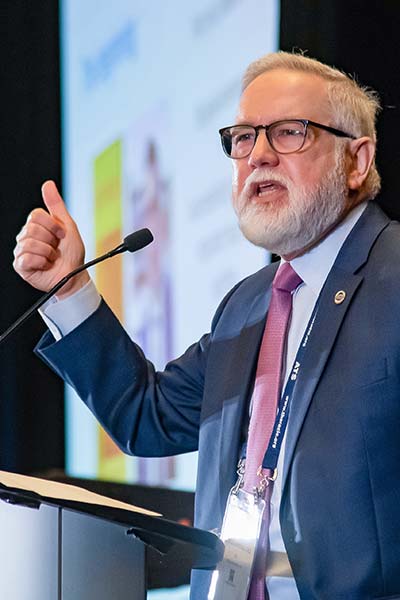Jesse Roman, MD, a founding leader of the Health Equity Subcommittee within the ATS Health Equity and Diversity Committee and current treasurer of the Society, was the keynote speaker during the Diversity Forum on Sunday afternoon, May 15, during the International Conference.

Dr. Roman imparted several powerful messages about diversity and mentorship as he spoke of his family lineage in Puerto Rico and his journey from there to his current leadership positions at Jefferson Health in Philadelphia, which include enterprise division chief for pulmonary, allergy, and critical care medicine.
He also spoke of the history of racism in Puerto Rico, showing an image of his family church that once had a separate entrance for Black people bringing their babies to get baptized. And he recounted the time a U.S. Marine hospital physician stationed on the island besmirched Puerto Ricans by writing a report in 1900 stating that they were a class of people of no great endurance, badly infected, and living in poor hygiene.
“These are my family members, these are my parents, these are me a little over 100 years ago,” Dr. Roman said. “They’re advising people not to invest anything at all, because we were sick and lazy.”
Dr. Bailey Ashford, another military doctor at the time, realized the residents were suffering from hookworm. Within a decade, he’d eliminated the intestinal parasites and saved an estimated 300,000 lives.
The bulk of Dr. Roman’s message was imparting the words of wisdom he has received from mentors. He spoke of his father, who was raised in poverty by a single mother in Puerto Rico but managed to earn a master’s degree in entomology and went on to become the dean of a school of culture and authored the book “Cicatrices,” which means scar of a healed wound.
In the book, he lays out a number of concepts that have guided Dr. Roman, including: find your passion, become a working doctor, and that accomplishing anything requires sacrifice.
His next mentor was Manuel Martinez-Maldonado, MD, at the Veterans Affairs Medical Center-Puerto Rico, where Dr. Roman completed his internship and residency.
Dr. Martinez-Maldonado would read poetry to his patients and had a side gig as an art critic. From him, Dr. Roman learned that even though he didn’t go to a college of great renown, he could still attain a pedigree simply by raising his hand every time someone asked for something.
From the VA in Puerto Rico, Dr. Roman moved on to a fellowship at Washington University in St. Louis, where he learned to be careful how he delivers a message.
“Do you realize that throughout your career, you’re delivering messages all the time?” said Dr. Roman. “You deliver a message to your colleagues when you’re talking, at this table when you’re eating, in your presentations, in your papers, in your grants. And it is all about the right message, and it takes effort and time and mentorship to develop that record.”
In the late 1980s, Dr. Ramon applied for the The Robert Wood Johnson Foundation’s Amos Medical Faculty Development Program, only to learn that he was expected to make a presentation before the board in New Jersey the same day his wife was due to give birth to their first baby. He had decided to forgo the interview — and hence the program — when his wife’s doctor suggested they do a C-section the day before. As Dr. Roman describes it, his daughter was born at 10:15 a.m., he grabbed the placenta, put it in a bucket and ran it to a freezer so he could study it later, and managed to be standing before the board at 9:15 the following morning giving his presentation.
“I’m pretty sure they gave it to me out of pity,” he said. “And I bring this up because we often talk of the sacrifices we give. But we rarely talk of the sacrifices of those around us who helped us get to where we need to be. We do it with children, brothers and sisters, parents, friends, colleagues. That’s where the sacrifice is.”
Dr. Roman then recounted his last stop, at Emory University, where he met Roland H. Ingram, MD, who conveyed more important lessons to him, including to focus on what really matters, that some things can wait until tomorrow, and that you must master the fundamentals. You might be great at science, he would say, but you better know how to care for your patients.
In other words, Dr. Roman recalled Dr. Ingram saying, “You better be a damn good doctor!”
The 2022 Diversity Fellowship recipients and the Minority Trainee Development Scholarships were also presented at this forum. MTDS recipients are selected for the quality of the science in their submitted abstracts, among other criteria. The MTDS is celebrating its 20th anniversary this year.
The 2022 Diversity Fellowships are designed to support the efforts of senior fellows, post-doctoral students, or junior faculty with research, clinical, and policy endeavors to advance health equity for patients with respiratory disease, critical care illness or injury, and sleep-disordered breathing.
The Diversity Forum was presented by the ATS Membership Committee and hosted by its Chair Clement Ren, MD, MBA, ATSF, and Vice Chair Meshell Johnson, MD.
Extend Your Learning Beyond San Francisco with ATS 2025 Conference Highlights

With so many valuable educational opportunities offered during the ATS 2025 International Conference, attendees are often forced to decide which sessions to prioritize. That’s why the Society is offering three ATS 2025 Conference Highlights packages for those unable to attend ATS 2025 San Francisco or attendees interested in continuing their education after the conference. Check out the packages and pick the one that’s right for you. Learn at your own pace, whenever and wherever you are!

